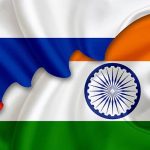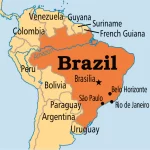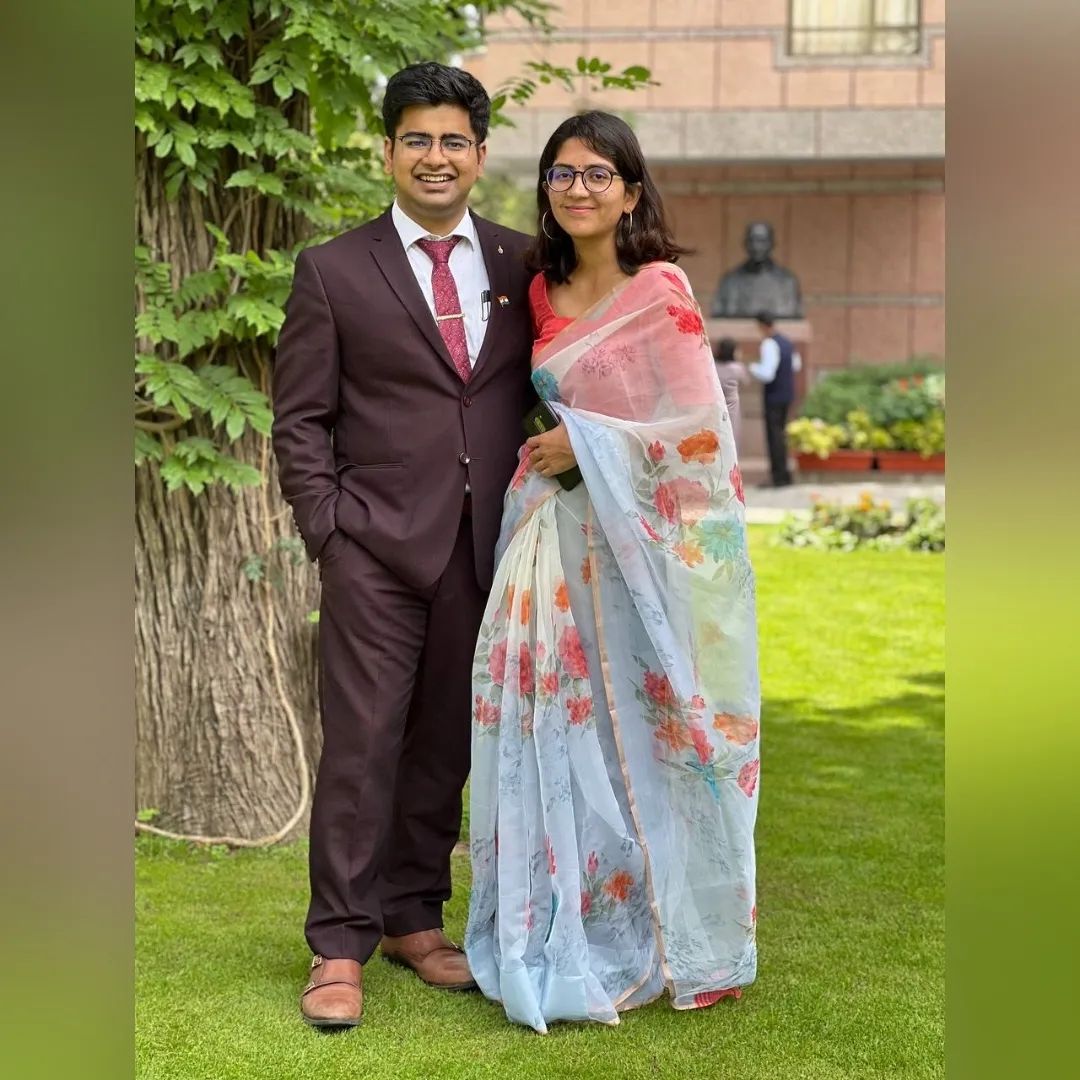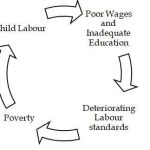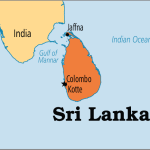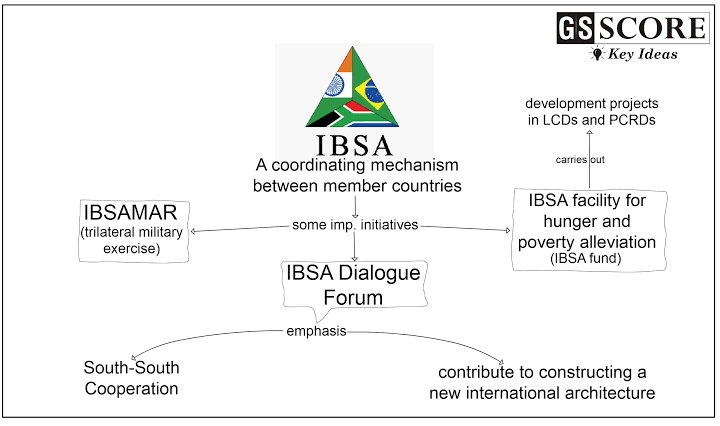
• IBSA is a unique forum that was made official by the Brasilia Declaration on June 6, 2003. It brings together India, Brazil, and South Africa, three big democracies and major economies from three different continents that face similar problems.
• All three partners are developing countries that are pluralistic, multi-cultural, multi-ethnic, multi-lingual, and multi-religious.
• IBSA was created in June 2003 as a way for three growing, multi-ethnic, and multicultural democracies to work together.
South-South Cooperation (SSC) is not a new concept. Its roots can be found in the work that countries and groups have done over many years to promote South-South unity. These include the Bandung conference in 1955, the Non-Aligned Movement in 1961, the G77 grouping, UNCTAD, the Buenos Aires Plan of Action in 1978, and the Nairobi declaration in 2009.
IBSA Dialogue Forum is an international group made up of three countries: India, Brazil, and South Africa. Its goal is to promote international cooperation between India, Brazil, and South Africa. It is made up of three important poles for promoting South-South cooperation and better understanding between three important developing world continents: Africa, Asia, and South America.
Table of Contents
Objective:
• Help build a new international architecture;
• Speak with one voice on global problems;
• Strengthen their ties in different ways;
• IBSA is also open to real projects of cooperation and partnership with less developed countries.
Principles:
• The IBSA Dialogue Forum is based on the principles, norms, and values of participatory democracy, respect for human rights, and the Rule of Law. • The strength of IBSA is that the three countries all agree that democracy and development help each other and are key to long-term peace and stability.
Structure
IBSA has an open and flexible organisation. It does not have a headquarters or a permanent executive secretariat. At the highest level, it relies on the Summits of Heads of State and Government.
Initiatives of IBSA
• The IBSA fund has set up a number of development projects in countries like Vietnam, Cambodia, Burundi, and others that are in need. • The external ministries of the three countries are working together to make a coordinated group.
• Through the Research and Information System for Developing Countries in Delhi, India has been running the IBSA Visiting Fellows Programme.
• Joint Naval Exercise: The IBSAMAR (IBSA Maritime Exercise) is an important part of the military cooperation between the three countries in the IBSA.
Cooperation of IBSA Countries
• Political coordination
• Sector cooperation through 14 Working Groups
• IBSA Facility for Poverty and Hunger Alleviation (IBSA Fund)
• People-to-People forums (Participation of other groups besides the Executive, such as civil society)
IBSA’s South-South Cooperation Declaration
• SSC is an effort by the people and governments of the South to work together. It talks about how people in the global south have had similar histories, ways of thinking, views, and experiences as they have grown.
• Developing Countries as Developing Partners: Developing countries that take part in SSC are neither donors nor receivers; instead, they are partners in developing.
• The main ideas behind SSC are solidarity and the spirit of giving.
• Voluntary: SSC is not required, like Official Development Assistance (ODA), but people can choose to do it if they want to.
• Process based on demand: Partner countries decide which SSC projects are most important. The States themselves are the ones who are most responsible for growth because they own and run them.
• The SSC is based on respecting the freedom of each country. It is based on the principles of respecting national sovereignty, national ownership and independence, equality, non-conditionality, not interfering in domestic matters, and mutual benefit.
• South-South Cooperation Adds to North-South Cooperation: South-South Cooperation helps speed up the development plan by adding to North-South Cooperation. It does not replace it. It asks the global North to fulfil all of its ODA promises, increase the resources it already has, and pledge more resources to make sure that the goals of the Paris Agreement on Climate Change and the SDGs can be met.
IBSA Mechanism for Development Cooperation—IBSA Fund for the Elimination of Poverty and Hunger
• It was made with the goal of making it easier to carry out projects for human development that help fight poverty and hunger in emerging countries.
The IBSA Fund is run by the United Nations Office for South-South Cooperation (UNOSSC). Each partner country gives $1 million a year to the fund.
• Over the last 10 years, the IBSA Fund has worked with 19 countries from the Global South on 26 projects with a total investment of $35 million. The Least Developed Countries (LDCs) have been given 62,4% of the IBSA Fund.
Relevance of IBSA vis-à-vis BRICS
Even though the annual BRICS Summits get more attention in international matters, the three IBSA members see themselves as partners because they agree on a set of basic ideas about how the world should be run.
All three IBSA members are multiparty democracies, so they can talk freely about how to adopt hard reforms that are needed to boost growth in a political environment that is messy and complicated. At BRICS Summits, these things can’t be talked about freely.
• In the same way, human rights and civil society problems are not talked about when the BRICS get together. During the 2011 IBSA Summit, the Brazilian President was able to get the “Responsibility While Protecting” idea into the final declaration. This is a concept that tries to qualify and improve the “Responsibility to Protect” idea, but it failed to do so at the 4th BRICS Summit a few months later due to opposition from China and Russia.
• They all think that the current international arrangements are unfair and need to be changed because they are new countries that are not yet fully integrated into them. India is much more opposed to the Non-Proliferation Treaty (NPT) than Brazil is, but all three agree that they deserve more institutional responsibility, including permanent seats on the UN Security Council.
• IBSA provides an intimate setting that isn’t affected by sometimes tense bilateral relations. After all, relations between India, Brazil, and South Africa are still too new to have any real impact.
The Next Steps
Strengthening IBSA is also a good thing from the BRICS’s point of view. It will make BRICS’s voice stronger in other international institutions and forums. IBSA’s main goals are to help build a new international architecture, bring their voices together in the world, and deepen their ties in different areas. This gives IBSA a unique role in the global south.


